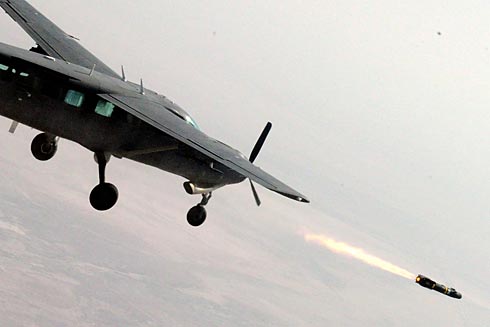While the media has made much of both the Iraqi government’s request for air strikes on the Al Qaeda aligned fighters from the Islamic State of Iraq and al-Sham (ISIS) and the Obama Administration’s refusal to do so, few people have bothered to look at what airpower was available to the Shia dominated government of Iraqi Prime Minister Nouri al-Maliki. In fact, the Iraqi Air Force has had light gunships based on the Cessna C208 Caravan capable of firing Hellfire missiles since 2011 that should have been fully capable of dealing with the ISIS “technicals” — armed light trucks — seen in many photos recently.

See this link and text:
Alliant Techsystems has announced delivery of a third AC-208B “Combat Caravan” aircraft to the Iraq Training and Advisory Mission in Kirkuk, Iraq. To date, ATK has delivered 11 modified C-208 aircraft in support of U.S. Government contracts for rebuilding the Iraqi Air Force: three reconnaissance aircraft, five trainer aircraft and three AC-208B aircraft. The AC-208B Combat Caravan aircraft is a specially modified Cessna Grand Caravan that incorporates an electro-optical targeting system with integrated laser designator, Hellfire laser guided missiles, an air-to-ground and air-to-air data link and aircraft self-protection equipment.
See also this link and ATK press release photos:
http://defensetech.org/2011/10/26/atks-ac-208-combat-caravan-gunship/

Whether the current Iraqi government there has any left in operable condition is a very different question. I very strongly suspect that most of the 30,000 Iraqi Army troops that deserted in the face of the ISIS attack had not been paid in months, with most of their weapons, radios and vehicles either being sold or deadlined from issues of corruption.
What we are seeing with the Iraqi government is a collapse from corruption. If the CIA had any capable human agents on the ground outside the Green Zone — ones that were paid attention too — none of that would have been a surprise to the Obama Administration.
Now we have “Saigon in Baghdad,” with a President that has all the bad features of the Nixon Administration and is isolationist to boot.